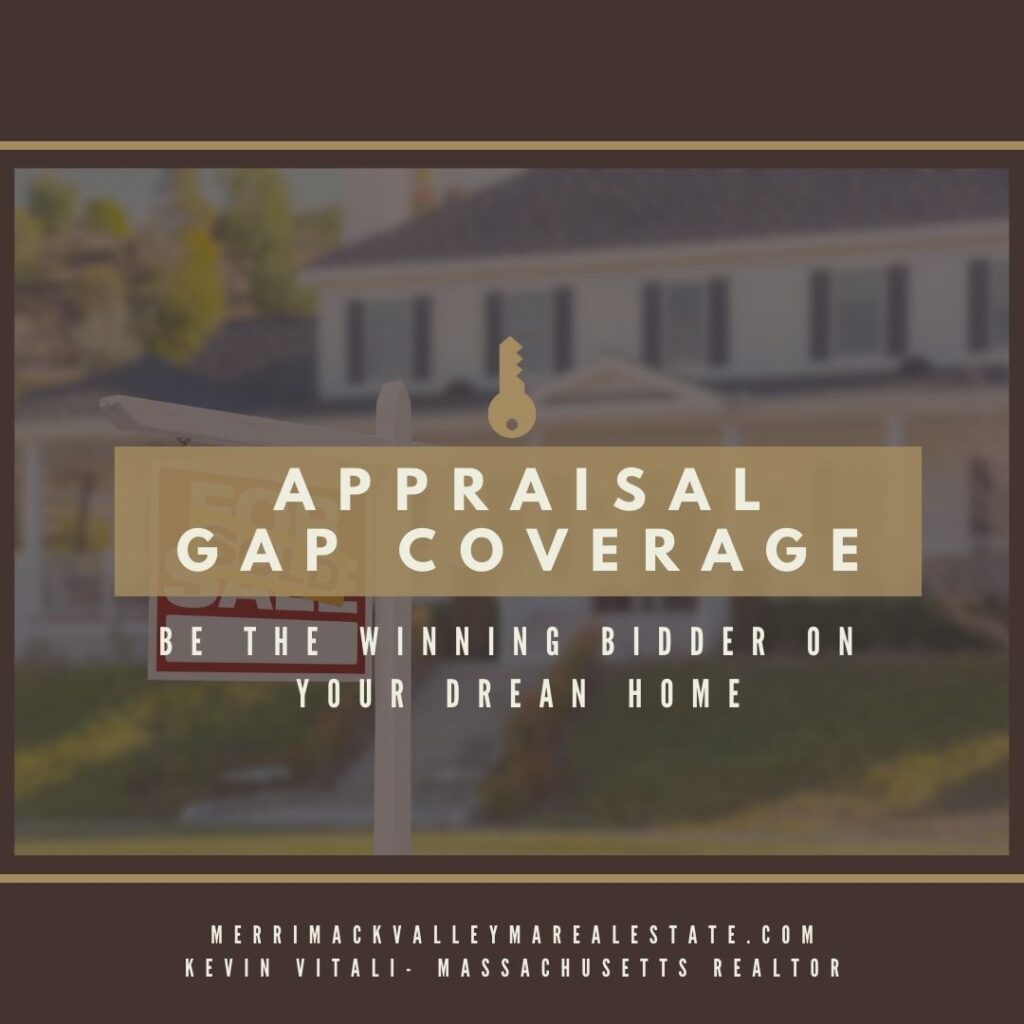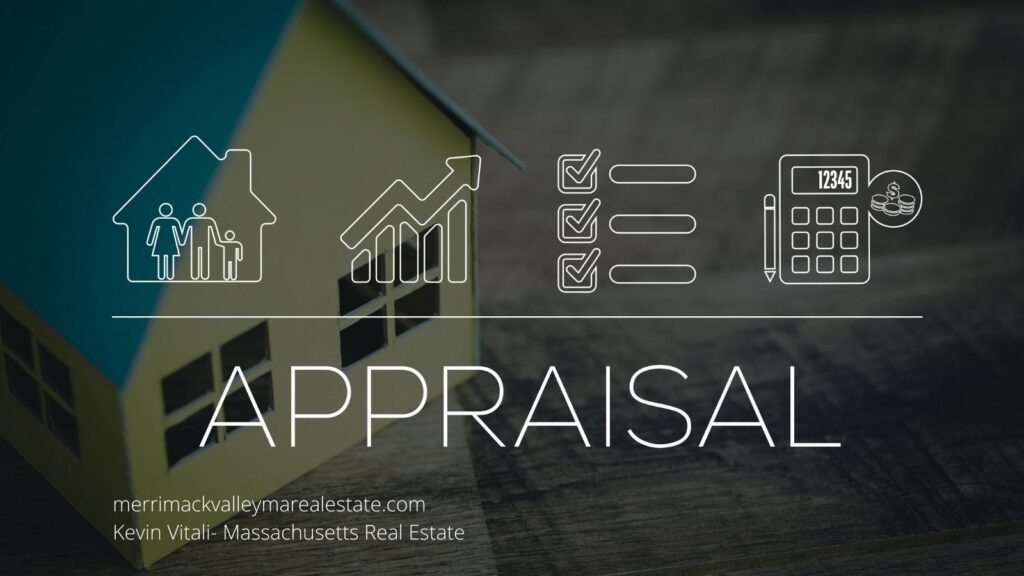The beginning half of 2021 has been a red hot market seller’s market. Low inventory and low-interest rates is making competition fierce among homebuyers in just about every market in the United States.
Having good financing may no longer be good enough to secure the home of your dreams. Many buyers are finding themselves in a bidding war and willing to pay more than the list price. But, buyers arent just offering above the sale price, they are willing to remove their home inspection contingency, use an escalation clause, offering to pay the seller’s closing costs, let the sellers stay rent-free past closing, etc….. Now, a recent trend is buyers are now willing to remove the home appraisal contingency and offer appraisal gap coverage to the seller.

Before we delve into appraisal gap coverage let’s look at a few things first.
What Is An Appraisal?
An appraisal is a valuation of a home by a licensed appraiser. It ensures the lender you are financing your home through, that the home you are looking to purchase is in the range of market value. Basically, it is letting the mortgage lender know that they are lending on a property at fair market value and the loan amount is equal to or less than the home is worth taking into account your down payment. The appraisal is a safety net for the bank to recoup their money if you should stop paying your mortgage.
Because a lender requires an appraisal, an appraisal also becomes a safety net for the home buyer as well, giving the home buyer confidence they are not overpaying for the home. The appraisal process is an important part of securing a home loan.
An appraisal report is where the subject home (the home that is being purchased) uses recent comparable sales to come up with an appraised value of a home.
What Is An Appraisal Gap?
An appraisal gap can occur in hot real estate markets when there is a high demand among home buyers for good homes and it is a competitive market. In hot real estate markets, a buyer will often find themselves in a multiple offer situation and the buyers are competing to get the seller’s attention. In my particular area, you can almost guarantee that the offer competing, buyers will be over asking and in some cases quite significantly.
The appraisal gap is the difference between the appraised value of the home and the purchase price if the appraised value is lower than the contract price. While an appraisal gap can happen in any type of real estate market it is more likely to happen in a strong seller’s market. For example:
A home buyer and home seller agree to a sales contract price of $500,000 which is $50,000 over the asking price of a home. For example:
The appraised value is only $485,000.
This leaves a gap of $15,000.
The buyer’s lender is providing will only lend on a purchase price of $485,000. This leaves a $15,000 deficiency that needs to be covered. Either by the home buyer bringing the entire difference of $15,000 to the closing table or the seller reducing the contract price to the lower price of the property value assigned by the lender. Or, a combination of both.
What Is An Appraisal Contingency?
A real estate contingency is where there is a requirement for an event to happen for the contract to be in full force. If the event does not occur then the contract is null and void and all deposit monies are returned with no further recourse from either party.
Many standard real estate contracts have a mortgage contingency and/ or an appraisal contingency. It basically states that you are putting a certain percent down as a down payment for the bank and you have a certain amount of time to obtain a loan commitment prior to the closing. Or, if it is an appraisal contingency the sale is contingent on the sale appraising at or above the purchase price. If there is a windfall between the appraised price, the down payment and the purchase price, the buyer may not be able to obtain financing from their lender.
In either case, in the event a property does not appraise, as spelled out with the financial details in the contract, the buyer could be able to nullify the contract and receive their home deposit money back. The seller always take some risk by accepting a contract with a mortgage or appraisal contingency.
Why Would A Seller Be Concerned With An Appraisal Gap?
Of course one of the biggest goals of a home seller is to net the most amount of money they can out of a home sale. The home seller and listing agent work to get just the right asking price on a home, based upon recent sale prices of similar homes.
But, in a hot housing market, you will find home prices pushing up quickly, as well as buyers willing to submit a highly competitive offer on a home. We are seeing homes have 30 offers over the asking price. And, you might think, that the seller would choose the highest offer as the best offer. But, the best offer is not always the one with the highest price.
A seller has other terms to consider. Is it a cash offer vs an offer financed with a conventional loan backed by Fannie Mae? Are the buyers retaining the right to a home contingency? …..and many other considerations that go into selecting an offer. A cash buyer generally does not have an appraisal contingency clause in their sales contract making it an extremely attractive offer.
It limits the risk to the home seller.
But a buyer financed by the lender will have a mortgage contingency clause. The clause states that if the buyer cannot secure financing by a certain date that the buyer can withdraw their contract and receive all of their earnest money deposit back. A low appraisal can trigger the mortgage contingency clause. This leaves the seller high and dry with no contact or sale on their home. This makes it a little harder for bank financed offers to compete with cash offers.
While a cash offer may be a slightly lower offer, the bottom line is the seller does not need to be concerned with a low appraisal and the hassles of a deal not closing.
Or, even if there are no cash offers to contend with, there may be an offer with a higher price on the table where there is a question of whether the home will appraise or not.
It presents a level of risk for the seller. In a slower market, a low appraisal could trigger a renegotiation of the purchase price between the buyer and seller. But in today’s market sellers do not need to concern themselves because there are many buyers willing to provide appraisal gap coverage for any appraisals with lower values.
This allows the seller to get the agreed upon price in their purchase agreement and the buyer bringing additional cash to the table to cover the gap.
Buyers with plenty of cash behind them have often chosen to waive the appraisal contingency in the event there is an appraisal gap. But this was usually a buyer’s decision based on wanting to strengthen their offer. In today’s crazy market, it has gone beyond that and it is almost expected that the home buyer waive their appraisal contingency in some hot real estate markets.

Appraisal Gap Coverage
So that begs the question what is appraisal gap coverage?
This is where a buyer agrees that they will cover the gap between a low appraised value of a home. Meaning if there is a $50,000 difference the buyer will bring the additional $50,000 to the closing table.
A buyer can agree to cover any deficiency or if they are working with limited funds cap the amount of the appraisal deficiency they are willing to cover. A clause can be added to the buyer’s offer stating: Purchaser agrees to pay $10,000 over the appraised value if the appraisal comes in lower than the purchase price. The purchase price is not to exceed $XXX,XXX.
Often an appraisal gap between the agreed-upon contract price and the appraised value can be estimated by an agent representing you. Be prepared to provide proof of funds showing you can cover an appraisal gap above and beyond your down payment and closing costs.
At the end of the day providing a seller with appraisal gap coverage may help you be the winning bidder on a home. It allows a seller to move on with confidence with your offer.
Appraisal Gap Insurance
There is a possibility to keep your original purchase price and the original lower appraisal. Your mortgage lender can lower your loan to value ratio and you pay additional Mortgage Insurance to cover the lower appraisal. You can cover your appraisal gap with your mortgage by paying additional Mortgage Insurance for only several thousand dollars.
The Mortgage Insurance can be covered with an upfront payment or financed monthly.
It is a complex scenario, but discuss the possibilities with your mortgage lender.
Does A Lower Appraisal Mean You Are Overpaying For A Home?
A lower appraised value on a home does not necessarily mean you are overpaying for a home. In competitive bidding wars, there is usually a whole slew of buyers willing to pay close to what you are willing to pay for a home. Fair market value is an indication of what the market is willing to pay for a home and that is established by other home buyers willing to pay close to the same amount you are for a home.
Remember home appraisals use past sales history of comparable homes which are a lagging indicator of a property’s value. The key factor is other buyers are willing to pay the same of close to what you are willing to pay for a home.
On the other hand, if you are offer is $50,000 dollars higher than the next offer then I would say you are overpaying. But in a seller’s market with multiple offers, the winning offer is usually the same or similar to the next competing offers only inching out the other offers by slightly better terms or price.
Summary
Use an appraisal cap coverage clause could be one of many ways to help strengthen your offer. Discuss with your real estate agent and mortgage broker the possibility of using an appraisal gap clause in your contract that will cover some or all of the difference between a lower property appraisal and the purchase price. It could be the tipping point that gets your offer accepted.
If you feel you would like to add an appraisal gap clause to your contract just make sure you have the funds to cover the differential.




